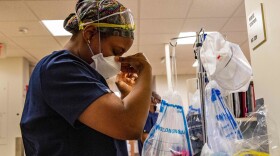
Will Stone
Will Stone is a former reporter at KUNR Public Radio.
-
The omicron surge has clogged up the health care system, from the ICU to the ER. The consequences are huge for smaller hospitals and, in some cases, it has led to irreparable harm.
-
More than 900,000 people in the U.S. have now died from COVID-19, but that figure doesn't capture the full impact of the disease.
-
Slammed by COVID-19, many U.S. hospitals have put off essential procedures. Delays are leading to consequences like heart attacks and sending people to emergency rooms to get care.
-
People who get infected with omicron are less likely to go to the hospital, go on a ventilator or die. But with the current huge volume of patients, hospitals are still struggling to treat them all.
-
A Seattle hospital confronts the omicron surge. While COVID-19 patients aren't as sick compared to earlier waves, there is a record number of patients overall, and not enough staff to care for them.
-
In the U.S., more people are hospitalized for COVID-19 than at any other point in the pandemic. The omicron variant has slammed ERs, but doctors say this surge feels different than earlier ones.
-
There are more patients and, in some places, not enough health care workers to go around. Research shows the crowding will impact care and increase mortality for all patients.
-
Some hospitals report less strain as omicron seems to cause less severe illness. But they're still overcrowded with patients. Research shows death rates rise significantly when hospitals are full.
-
Researchers are looking at data from U.S. cases to determine if the variant causes milder disease. Even if the answer is yes, they say, rates of hospitalization could be high during the surge.
-
Scientists are trying to figure out why the omicron variant is spreading so much faster than delta did. Early research provides a few possible reasons.





